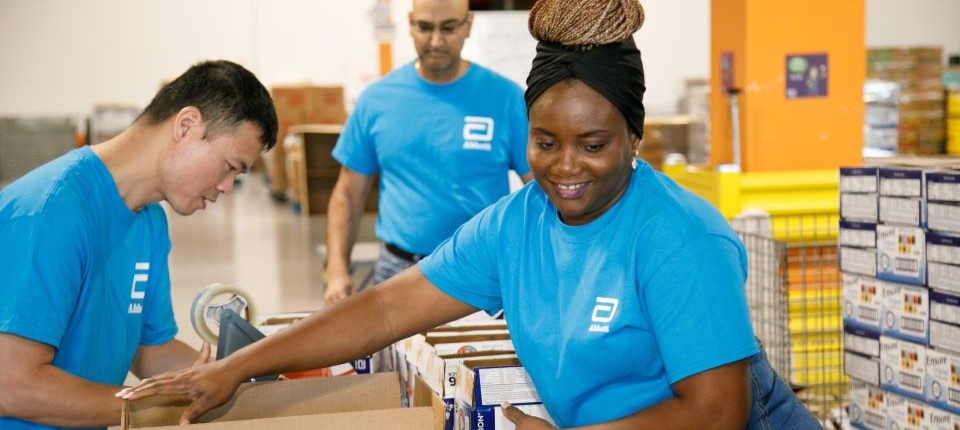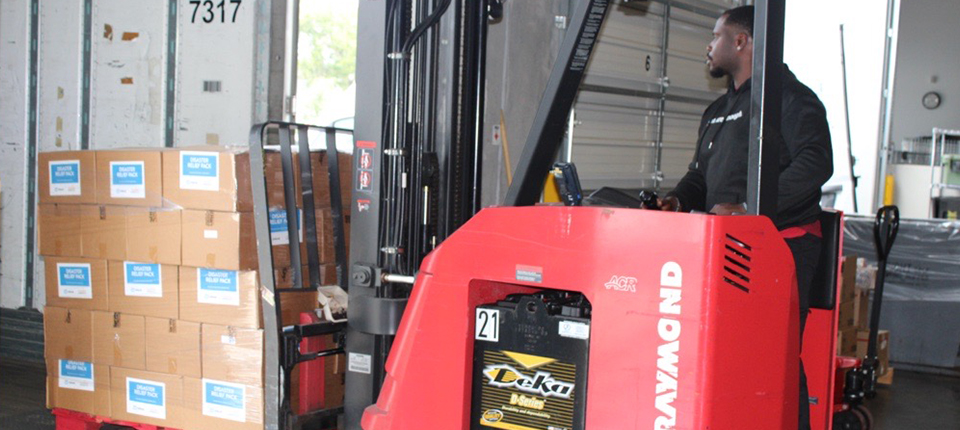
Going Beyond Disaster Relief To Disaster Resilience
Abbott, nonprofit partners build resilience in communities most impacted by natural disasters.
Sep. 27, 2022
- Copy Link
- Share on X
- Share on Facebook
- Share on Linkedin
Resilience. It's often defined as the ability to recover quickly from challenges and difficulties. It requires adaptability and is a skill that is especially important for families and communities facing extreme weather or other unexpected challenges where so much can change – without warning.
When natural disasters like hurricanes hit, there is always an immediate need for food, water and medical supplies. However, organized disaster-relief efforts can take days to ramp up – putting communities in danger, especially residents facing ongoing health challenges and food insecurity.
That's exactly what the world saw after Hurricane Katrina ravaged communities across the southern U.S. 20 years ago in 2005. Damaged and flooded roads severely limited access to some communities, leaving many families without urgently needed relief. The biggest lesson from Katrina was that more needed to be done to help communities prepare in advance. So that's exactly what we did in 2006 – launching two initiatives to support health clinics and food banks in advance of hurricane season.
Preparing for Hurricane Season: Providing the Right Products in the Right Places
Since 2006, we've partnered with two organizations – Feeding America® and Direct Relief – to help communities better prepare for hurricane season by storing nutrition and healthcare products at clinics and food banks in high-risk areas.
"Disaster Relief Packs" for food banks: Abbott and Feeding America provide nutrition disaster relief packs to local food banks in areas at risk of hurricanes, including Florida, Louisiana, Puerto Rico and Texas. Designed to be given directly to families affected by disasters, the packs can help meet immediate nutritional needs for three days.
Tailored to different family sizes, the packs contain Abbott nutrition products for children and adults, including Pedialyte® rehydration solutions and Ensure® and PediaSure® nutrition drinks. This year, 4,000 packs will provide rapid nutrition support for 12,000 people.
"Disaster Relief Modules" for health clinics: Abbott is also proud to continue working with Direct Relief to provide supplies for disaster relief to 70 health clinics providing community medical care across the U.S. Southeast and Gulf Coasts, Puerto Rico and the U.S. Virgin Islands. This year, these modules are providing clinics with the key first aid supplies and medicines they need to treat 350 patients for one month following a disaster.
In the first year of the partnership in 2006, the Direct Relief modules contained only Abbott products. Today, the modules include essential products from many other healthcare companies along with Abbott diabetes care products. This year, the modules will serve approximately 24,500 people in need.
Over nearly two decades, these two initiatives have provided critically needed support for 700,000 people. This includes 14,000 people who were directly supported in 2024. For 2025, we are providing an additional $1.2 million worth of pre-positioned nutrition product donations, increasing the total number of people who will benefit to more than 270,000 this year – and nearly 1 million overall to date.
Working to Help Build Year-Round Resilience
We know product donations are not enough to build capable and reliable disaster response systems. Building community resilience means constantly thinking ahead, identifying and taking preventative measures to avoid and lessen the impact of disasters, adapting to unforeseen circumstances and listening closely to specific community needs.
"What resilience looks like for one community may be very different than another. Every community faces unique challenges before – and certainly after – natural disasters," said Suki McClatchey, director of global citizenship, Abbott. "We don't have all the answers, but we are committed to listening and working in close collaboration with on-the-ground partners to help identify and meet the needs of each community before disaster strikes. As we learn more, we continue to shift our thinking and approach to take a more proactive role in preparedness – going beyond product donations to investments in local capacity."
Unfortunately, many communities most vulnerable to climate change and extreme weather are also those that are historically underinvested in other areas. These communities may be more prone to more significant impacts from disasters, and face greater challenges in recovering.
That's why Abbott and Abbott Fund are implementing targeted disaster resilience strategies to help prevent and mitigate the impact of hurricanes and other disasters on communities in the U.S. When selecting local food banks for this program, we looked to internal Feeding America data and national disaster sources for guidance, including the FEMA National Risk Index, historical disaster load data and Feeding America's equity index.
The focus of these efforts is on providing grants for infrastructure and systems at food banks and community health clinics to strengthen their capacity to mitigate the impact of disasters. This includes investments in alternative power sources, infrastructure strengthening, heavy equipment and supplies, and staff training.
For example, in 2024 our grants helped a health clinic in Puerto Rico to equip four mobile medical units with solar panels. This improved their ability to provide continuity of care following disasters, and also reduced their monthly fuel cost by 75%. In Beaumont, TX, our funding supported the purchase of a new generator at a food bank.
This year, we'll continue to offer support to the food bank in Beaumont, and provide new support for food banks in Alabama, Mississippi and Florida. We'll also support resiliency work at health clinics in New Orleans and North Carolina. These investments will help strengthen communication systems, expand medical outreach, create a transportable disaster response site and improve operational efficiencies.
Longstanding Support for Communities Affected by Disasters
Abbott is a longtime supporter of disaster relief efforts worldwide. Over the past decade, Abbott and Abbott Fund have provided more than $70 million in funding and products to help meet both immediate needs and support long-term recovery efforts.
In recent years, this included a rapid response to wildfires in California and Hawaii, Hurricanes Helene, Milton, Beryl and Debby in the U.S. and the Caribbean, earthquakes in Turkey, Morocco, Japan and Taiwan, and severe flooding in Southern California.
In 2024, following Hurricanes Helene and Milton, we provided $500,000 from Abbott Fund, and approximately $1.5 million in nutritionals and other product donations to support relief efforts.
This story was originally published on June 14, 2023 and updated on May 15, 2025.
Related articles
-
Sustainability
Helping People Recover from Devastating Hurricanes
Working with our disaster relief partners, we’re helping families affected by Hurricanes Helene and Milton.
For the latest on Abbott’s life-changing technology, get updates directly in your inbox.
